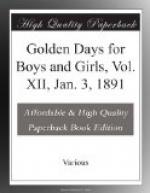It was evident that this repast was considered a great treat by both Diego and his aunt. When they had finished, the latter said:
“Now, Diego, if you and your friend will take a basket of washed clothes over into the city, to the hotel for which I work, you will do me a favor.”
“Why not?” answered Diego, who then explained to Lee what was wanted.
The old woman soon had the large, square basket packed and covered with a clean checked cloth, and then said:
“Here, Diego, take these coppers for the ferry-boat, and here are the lists and the bills. You will get the money and bring it back to me.”
The boys set off at once, crossing the bay to the city in the balmy clear, tropical morning, so charming before the sun gains its full power, and having a long trudge before they came to their destination.
In this neighborhood Lee saw a very different state of things from that at Regla. They passed a great square, planted with palms and flowering plants, such as he had only seen in pictures heretofore. Then there were long ranges of public buildings and grand houses, with sentry-boxes in front of them, and sentinels pacing to and fro.
They also met frequently battalions and companies of troops, going to relieve guard or returning from early parade, stepping out briskly over the clean-swept pavements to lively airs played by the bands. Everything, at that hour, was life and bustle, for most of the business of the day is done in the early morning, that people may have time to take the “siesta” during the hot hours.
All these strange sights seemed to divert Lee’s thoughts from the heavy basket which they were carrying, and he was still staring about when Diego stopped before a large, low, two-storied building, with a great arched entrance into a court-yard, around the four sides of which the building extended. Above the arch hung a sign, with “Hotel de los Estados Unidos,” painted upon it.
“Well, I know what that sign means,” said Lee; “and it’s the first one I’ve seen which I did understand.”
“Yes, here we are at last,” replied Diego.
And they turned in and came out in the large court-yard, which presented quite an animated appearance.
A fountain was playing in the middle, surrounded by orange trees, bananas and flowering plants, in great green tubs. All around, the doors of sleeping rooms opened upon the court, while above, another set of doors opened upon a balcony, which was reached by steps below.
On the pavement of stone were many little tables, at which gentlemen and ladies were taking breakfast, and waiters in white jackets were bustling about and supplying their wants.
On the left, as the boys entered, was an office, with a half door and a shelf upon it, from which a clerk hailed them:
“Hi, muchachos, qui quiere?” (What do you want, you boys?)




